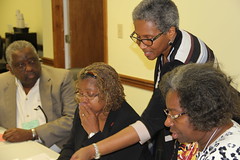 December 11, 2013, Jackson, MS – Twenty-five community leaders, educators, policy makers, and education advocates joined together with staff from Yale University’s Comer Development Center in an effort to introduce the Comer Development Model to education stakeholders in the state and consider how the model might support the goal of creating a quality, first-rate education that addresses the needs of all students in Mississippi’s public schools regardless of circumstance. Participants included staff from the Mississippi Department of Education, Jackson State University, the Mississippi Association of Educators, the Mississippi Center for Justice, Operation Shoestring, and community organizing organizations working on educational policy issues across the state. Southern Echo, Inc. hosted the workshop, which was funded by Communities for Public Education Reform (CPER).
December 11, 2013, Jackson, MS – Twenty-five community leaders, educators, policy makers, and education advocates joined together with staff from Yale University’s Comer Development Center in an effort to introduce the Comer Development Model to education stakeholders in the state and consider how the model might support the goal of creating a quality, first-rate education that addresses the needs of all students in Mississippi’s public schools regardless of circumstance. Participants included staff from the Mississippi Department of Education, Jackson State University, the Mississippi Association of Educators, the Mississippi Center for Justice, Operation Shoestring, and community organizing organizations working on educational policy issues across the state. Southern Echo, Inc. hosted the workshop, which was funded by Communities for Public Education Reform (CPER).
As described in “Transforming School Leadership and Management, “The Comer Process is an educational change initiative based on the principles of child, adolescent, and adult development. It mobilizes teachers, administrators, parents and other concerned adults to support students’ personal, social, and academic growth. It also helps them make better programmatic and curriculum decisions based on students’ needs and on developmental principles. The Comer Process is not a project or add-on, but rather an operating system – a way of managing, organizing, coordinating, and integrating activities.”
Ellen Reddy, Executive Director of Nollie Jenkins Family Center in Holmes County, MS, and public education advocate, commented, “Education policy makers from time to time come up with appropriate policy changes and guidelines, but they seem to be more ignored than implemented largely because policy making hasn’t been an inclusive process. The Comer Process is transformative in that it values what each of us brings to the table and utilizes each persons expertise as an equal partner to improve both our schools and communities.”
“As educators we know that it’s vital to meet every individual child’s needs – be that academic, social, or emotional. The Comer Model supports creating a true partnership in shared decision making with educators, parents, and community to provide a comprehensive plan to make sure that individual student needs are met allowing them to become well educated citizens,” stated Beverly Brahan of the Mississippi Association of Educators.
The Comer Process, named for James P. Comer, MD, who developed it, focuses on enabling all of the education stakeholders to play an integral role in the development and implementation of the school model to develop the whole child.
“SDP is committed to the total development of children and adolescents by helping parents, educators, and policymakers create learning environments that support children’s development along the critical pathways. Children who develop well, learn well. Our vision is to help create a just and fair society in which all children have the support for development that will allow them to become positive and successful contributors in family, work, and civic life,” said Dr. Camille Cooper, Director of Teaching and Learning at Yale University’s Comer Development Center and workshop facilitator.
The Comer Process is built upon three structures that provide the “basic framework”: A School Planning and Management Team, a Student and Staff Support Team, and a Parent Team.
Each of these structures focus on accountability rather than blame, consensus decision-making through dialogue and understanding, and the exercise of responsibility buy ativan cheap through collaboration rather than turf.
Southern Echo’s Executive Director, Leroy Johnson, agrees with the principles of the Comer Model. “Introducing the Comer Model is a necessary step in combatting the arbitrary and capricious student discipline policies and practices that push students out of school and ultimately toward the schoolhouse to jailhouse pipeline that plagues our public schools, with particularly negative consequences for children of color, low wealth, or disabilities, “ said Mr. Johnson.
“While our state education leaders, and many local education leaders, acknowledge the problems that exists, they also often focus blame for these outcomes on the students and their parents, rather than the policies and practices, poor classroom management, and woeful negative leadership coming from school board, superintendents and principals who are ultimately in control and responsible for the existence of these conditions,” commented Mike Sayer, Senior Organizer and Training Coordinator with Southern Echo, Inc.
For example, students who show indications of difficulty in terms of academic or behavioral problems are supposed to receive assessment and supports through a Teacher Support Team and the Response to Intervention guidelines, which are also intended to assist teachers to learn how to appropriately respond to and assist with the particular needs of such students. In addition, there are commitments to use Positive Behavior Intervention Supports and conflict resolution strategies, all of which separately and in combination comprise meaningful alternatives to pushing students out of class, out of school, on to the streets and in to the juvenile justice system. Such students are entitled to an individual behavior plan which must be based on research-based evidence to support the strategies outlined in the plan.
But the student assessments made by a psychometrist or psychologist can be expensive and the school districts are reluctant to incur such costs (especially when their operating revenues from the state are drastically reduced). Further, there must be an appreciation for the needs of students who act out and this compassion and understanding is often lacking as a basis for helping students rather than casting them out.
Administrative frustration often leads to arbitrary, capricious and inappropriate disciplines that are counter-productive: beating students (so-called corporal punishment), suspension, expulsion, referral to the juvenile justice system, or warehousing students in non-productive in-school suspension rooms or poorly designed and operating Alternative Schools.
At the same time, parents and students often do not know their rights and, therefore, are not in a position to insist upon them and enforce them.
Nevertheless, each year by state statute there is an opportunity for parents and students to advocate for the adoption of better, more appropriate policies to guide teachers, administrators, students and parents by participation in the policy-making process.
Workshop participants will be working to introduce and implement the Comer Model as a part of their education organizing work. “The Comer process requires that community education stakeholders come together to work for the kinds of revisions identified in the Model, which may not be achieved all at once, but which over a period of time can vastly improve and transform the culture and quality of education in local schools,” said Helen Johnson, Southern Echo’s Education Coordinator.

